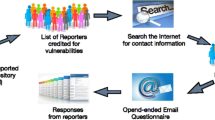Abstract
In this paper, we report results on a large scale measurement campaign to collect temporal information about events associated with software vulnerabilities. The data is curated so as to extract dates from each of the analyzed security advisories. The resulting time series are our object of study. From our measurements we were able to identify which role was assumed by different platforms (such as websites and forums) in the security landscape, including sources and aggregators of information about vulnerabilities. Then, we propose an analytical model to express the flow of information through security advisories across multiple platforms. The model is based on a queueing network, where each platform corresponds to a queue which adds a delay in the information propagation. Such delays, in turn, have an impact on the visibility of the information at different platforms. Leveraging the proposed model and the collected data, we assess how different system parameters, such as the delays incurred by each platform to propagate its messages, impact the overall flow of information across platforms.
Access this chapter
Tax calculation will be finalised at checkout
Purchases are for personal use only
Similar content being viewed by others
Notes
- 1.
The data and scripts to produce the reported results are available by contacting the authors.
References
de Boer, M.H., Bakker, B.J., et al.: Text mining in cybersecurity. Multimodal Technol. Interact. 3(3), 62 (2019)
Decan, A., Mens, T., Constantinou, E.: On the impact of security vulnerabilities in the NPM package dependency network. In: Proceedings of the 15th International Conference on Mining Software Repositories, pp. 181–191 (2018)
Frei, S., May, M., Fiedler, U., Plattner, B.: Large-scale vulnerability analysis. In: SIGCOMM Workshop on Large-Scale Attack Defense, pp. 131–138 (2006)
Gai, K., et al.: A novel secure big data cyber incident analytics framework for cybersecurity insurance. In: Big Data Security on Cloud, pp. 171–176. IEEE (2016)
Georgescu, T.M.: Natural language processing model for automatic analysis of cybersecurity-related documents. Symmetry 12(3), 354 (2020)
Harchol-Balter, M.: Performance Modeling and Design of Computer Systems: Queueing Theory in Action. Cambridge University Press, Cambridge (2013)
Horawalavithana, S., Bhattacharjee, A., et al.: Mentions of security vulnerabilities on Reddit, Twitter and Github. In: International Conference on Web Intelligence, pp. 200–207 (2019)
Hu, W., Wang, Y., Liu, X., Sun, J., Gao, Q., Huang, Y.: Open source software vulnerability propagation analysis algorithm based on knowledge graph. In: IEEE International Conference on Smart Cloud, pp. 121–127. IEEE (2019)
Huang, S., Tang, H., et al.: Text clustering on national vulnerability database. In: Computer Engineering and Applications, vol. 2, pp. 295–299. IEEE (2010)
Joh, H., Malaiya, Y.K.: A framework for software security risk evaluation using the vulnerability lifecycle and CVSS metrics. In: Proceedings of International Workshop on Risk and Trust in Extended Enterprises, pp. 430–434 (2010)
Johnson, P., Gorton, D., Lagerström, R., Ekstedt, M.: Time between vulnerability disclosures. Comput. Secur. 62, 278–295 (2016)
Li, V.G., Dunn, M., Pearce, P., et al.: Reading the tea leaves: a comparative analysis of threat intelligence. In: USENIX Security 2019, pp. 851–867 (2019)
MITRE: Common vulnerabilities and exposures (2020). https://cve.mitre.org/
Rassam, M.A., Maarof, M., Zainal, A., et al.: Big data analytics adoption for cybersecurity. J. Inf. Assur. Secur. 12(4) (2017)
Rosen, C., Shihab, E.: What are mobile developers asking about? A large scale study using stack overflow. Empirical Softw. Eng. 21(3), 1192–1223 (2016)
Ruohonen, J.: A look at the time delays in CVSS vulnerability scoring. Appl. Comput. Inf. 15(2), 129–135 (2019)
Ruohonen, J., Hyrynsalmi, S., Leppänen, V.: Modeling the delivery of security advisories and CVEs. Comput. Sci. Inf. Syst. 14(2), 537–555 (2017)
Shahzad, M., Shafiq, M.Z., Liu, A.X.: A large scale exploratory analysis of software vulnerability life cycles. In: International Conference on Software Engineering, pp. 771–781 (2012)
Wang, B., Li, X., de Aguiar, L.P., Menasche, D.S., Shafiq, Z.: Characterizing and modeling patching practices of industrial control systems. Proc. ACM Meas. Anal. Comput. Syst. 1(1), 1–23 (2017)
Woods, D., Moore, T.: Does insurance have a future in governing cybersecurity? IEEE Secur. Privacy Mag. 18(1), 21–27 (2019)
Zhang, S., Ou, X., Caragea, D.: Predicting cyber risks through national vulnerability database. Inf. Secur. J. 24(4–6), 194–206 (2015)
Acknowledgments
This project was partially sponsored by CAPES, CNPq and FAPERJ, through grants E-26/203.215/2017 and E-26/211.144/2019, as well as scholarships from Siemens Corporate Research.
Author information
Authors and Affiliations
Corresponding author
Editor information
Editors and Affiliations
Rights and permissions
Copyright information
© 2021 Springer Nature Switzerland AG
About this paper
Cite this paper
Miranda, L. et al. (2021). Measuring and Modeling Software Vulnerability Security Advisory Platforms. In: Garcia-Alfaro, J., Leneutre, J., Cuppens, N., Yaich, R. (eds) Risks and Security of Internet and Systems. CRiSIS 2020. Lecture Notes in Computer Science(), vol 12528. Springer, Cham. https://doi.org/10.1007/978-3-030-68887-5_2
Download citation
DOI: https://doi.org/10.1007/978-3-030-68887-5_2
Published:
Publisher Name: Springer, Cham
Print ISBN: 978-3-030-68886-8
Online ISBN: 978-3-030-68887-5
eBook Packages: Computer ScienceComputer Science (R0)




